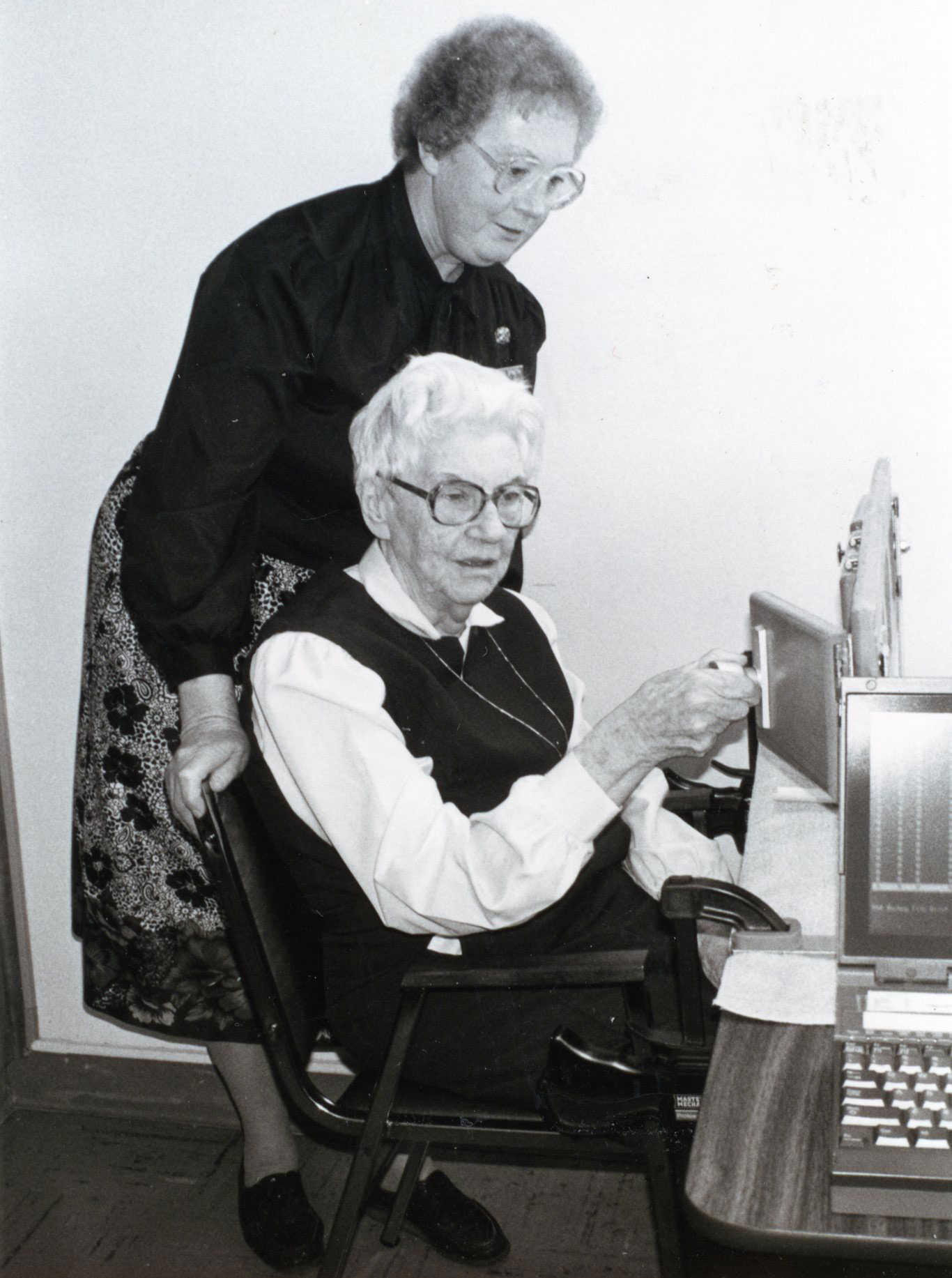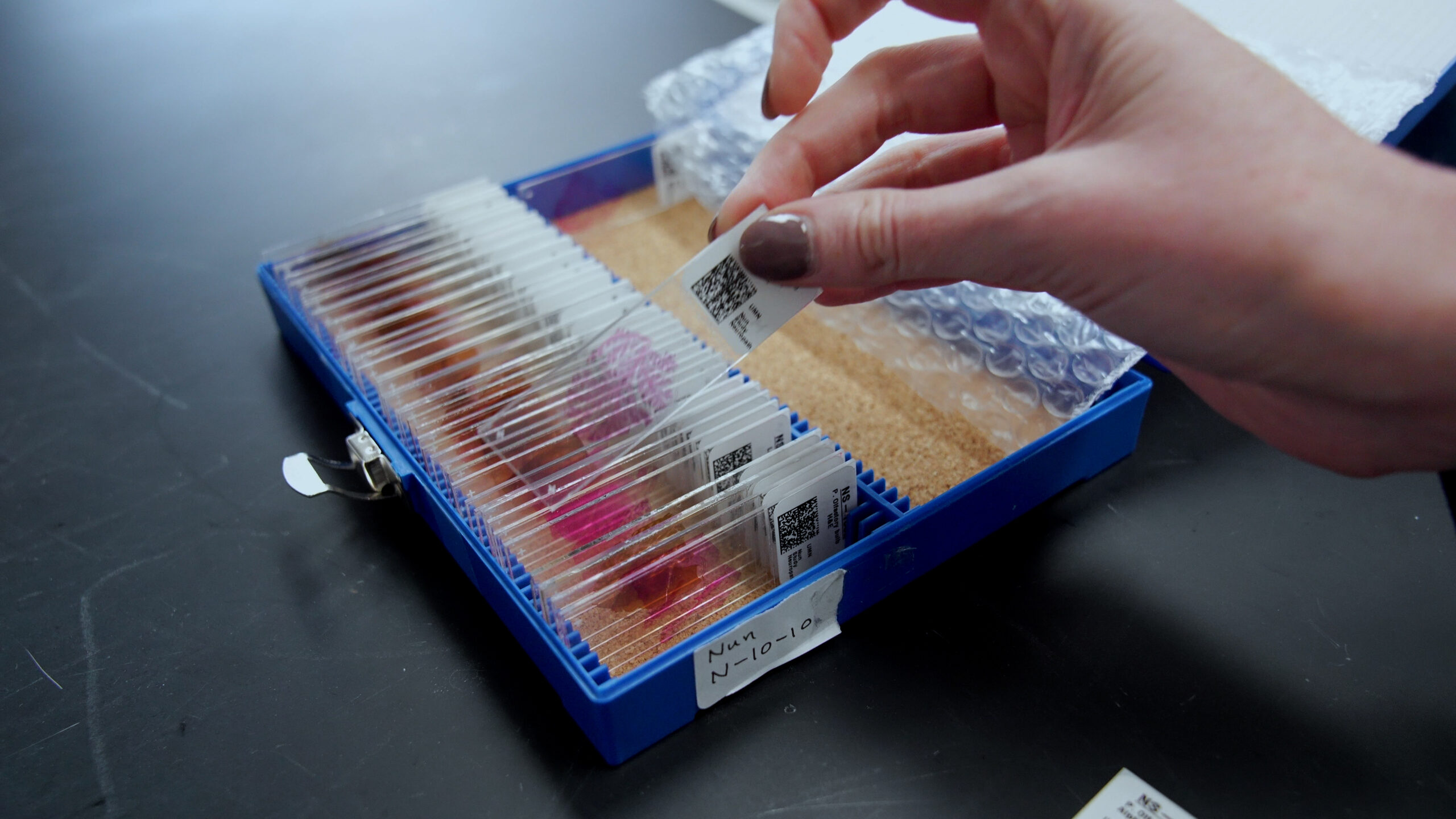Alzheimer’s study demonstrates SSND commitment to educating in broadest sense
One would not expect to find the School Sisters of Notre Dame, a congregation founded to teach girls in Bavaria, to be involved with cutting-edge biomedical research. And yet, the School Sisters of Notre Dame in North America have done just that.
The Nun Study, a National Institute on Aging (NIA) study on aging, Alzheimer’s and related dementias, began in 1990 with 678 School Sisters of Notre Dame. It continues to be an important body of research. At the time of their enrollment, sisters agreed to periodic cognitive and physical assessments throughout the rest of their lives as well as brain donation at death. Although all of the sisters involved with the study are now deceased, the sisters involved continue to impact Alzheimer’s research through the gift of their brain donations.

Sister Gabriel Mary Spaeth, a research associate with the Nun Study from 1991-2007, works with participant Sister Norita Reardon.
Ground-breaking Research
The Nun Study was incredibly unique at its initiation and has altered research ever since.
Yearly evaluations for participants in the Nun Study included various memory tests and physical functioning assessments, a one-time blood test for genetic evaluation of apolipoprotein E (a variation of which increases the risk for developing late-onset Alzheimer’s disease), and brain donation at death. Participation by sisters provided a homogeneity in living conditions, health care, and lifestyle that was difficult to control for in other studies.
In addition to this physical data, the study looked at extensive data provided by the SSND Archives from sisters’ early lives. Some of the study’s most well-known findings correlate information from writing samples created by sisters when they were young with the development of disease in later life. The study found that early life characteristics are predictive of the development of dementia many years later, but there is only data to support that this relationship is correlational in nature, not causal.

Specimens at the lab in San Antonio
The Nun Study was one the first to demonstrate that individuals differ in how much brain pathology must be present to produce clinical symptoms of disease. It was shown that one key variable in predicting the correlation between clinical status and Alzheimer’s disease brain pathology was the presence of stroke.
While the Nun Study has been continuous since 1990, it has been led by a variety of researchers and has been hosted at several universities. The constant is the role of the SSND in providing valuable information to influence continued research into treatments for Alzheimer’s and related dementias.
New studies in progress

Dr. Flanagan and her staff welcome SSND to their lab.
In 2021, Dr. Margaret (Maggie) E. Flanagan, MD, assumed the directorship of the Nun Study, marking a pivotal moment in the study’s narrative. She not only embraced the leadership role but also undertook the monumental task of relocating the priceless materials of the Nun Study from Chicago, Illinois, to San Antonio, Texas, bringing with her a wealth of knowledge and the legacy of the extraordinary participants. Since February of 2023, the Nun Study samples and archives have been safely stored at The University of Texas Health Science Center San Antonio (UTHSCSA) in the Biggs Institute for Alzheimer’s and Neurodegenerative Diseases. Here, Dr. Flanagan hopes to reestablish the Nun Study’s significance in research, continuing the efforts that began 36 years ago.
In addition to the ongoing Nun Study, SSND are also involved in The RUSH University Religious Orders Study. This study has enrolled currently living sisters, many of whom were too young to participate in the Nun Study when it began collecting data in the 1990s.
As they collaborate with the researchers and participate in these studies, School Sisters of Notre Dame are demonstrating that they truly are educators in all that they are and do.
To Learn More about the SSND Nun Study, as well as SSND involvement in other Alzheimer’s disease research:
How hundreds of religious sisters contributed to ‘groundbreaking’ 30-year Alzheimer’s study
Nun Study Director Receives Award to Fund Further Research
The Nun Study – Educators to the End
